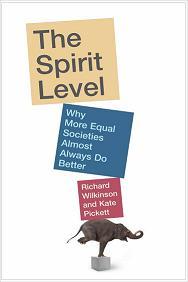Greater equality in all of our interest

An alliance dedicated to changing the structure of Irish society to make it more fair and equitable is crucial. By Vincent Browne.
The economic and financial crisis offers an opportunity to reshape this society, making it more democratic, fair and equal, and giving it a robust sense of solidarity. We are not talking about revolution here, nor communism, but changes which, intuitively, we all (or most of us) would welcome.
Also, there is persuasive evidence that more equal societies are healthier, less violent, more cohesive and happier (see The Spirit Level: Why More Equal Societies Almost Always do Better by Richard Wilkinson and Kate Pickett).
A few weeks ago I was at Dolphin House, off the South Circular Road in Dublin, where a thousand people live. Conditions there are appalling. Sewage coming up into baths, into kitchen sinks, and on to the street. Walls and ceilings cracking from dampness. The place is a hell-hole for infection. This is all within 15 minutes walk of St Stephen’s Green.
 There are hundreds of other such areas around the country, tens of thousands of people living in awful conditions, with all the attendant problems of drugs, crime, violence, ill-health and premature death.
There are hundreds of other such areas around the country, tens of thousands of people living in awful conditions, with all the attendant problems of drugs, crime, violence, ill-health and premature death.
We had vast resources for a decade and a half, and instead of putting resources into giving these hundreds of thousands of people decent housing, we constructed tax breaks that inflated the property bubble, eroded the tax base and in the end left us with a massive fiscal hole. Along the way, thousands became millionaires, thousands of top-of-the-range cars and yachts were bought, with helicopters, executive jets, trophy homes and trophy holiday homes, while the best of restaurants, spas and clubs sprang up.
We built motorways costing billions over projected budgets, marinas, a spanking new courts building – all given priority over basic amenities for hundreds of thousands of our citizens.
All this was because of our politics – a politics that wilfully gave (and gives) priority to extravagance over necessity. That politics persists with the bailout of the banks, representing the biggest ever transfer of wealth from the society as a whole to a wealthy elite. It persists with plans in the forthcoming budget to impose income taxes on those previously deemed too poor to pay, to cut health and education spending further, to target the very group that the ESRI recently identified as the most vulnerable – lone parents. There is a chance now to change all that, but only if the right options are taken.
There will be little change if all that happens at the next election is that the present Government is replaced by a Fine Gael/Labour administration. We know this from previous experience. Irish society was not structurally any different after the four years of a Fine Gael/Labour government from 1973 to 1977, nor after the coalition of 1982-1987, nor any different after 1994-1997.
Yes, there were some reforms. And yes, a change of government in itself is to be welcomed, for too long in government makes a stone of the heart. And the head! But these governments resulted in no fundamental change.
It is true also that Fine Gael has produced a plethora of impressive reforming. But any structural change, in the sense of a decisive shift towards a more equal society? It won’t happen with a Fine Gael-led government, because Fine Gael does not want a structural change. For this party, the present social structure is fine, with a few tweaks.
I had argued this case for some time, and urged an alliance of groups, parties and individuals committed to changing the structure of Irish society in the manner I have described.
Several initiatives to form such an alliance have been under way, some under the auspices of the Equality Rights Alliance, the Community Platform and Is Féidir Linn. I understand there have been such initiatives in Cork also. There was recently a meeting of the Dublin Trades Council (at which I spoke) on such an initiative, and this was attended by representatives of several organisations including trade unions, the Labour Party and Sinn Féin. I argued there, as I wrote in this column some weeks ago, that Labour should seek such an alliance, rather than revert again to coalition with Fine Gael, and Sinn Féin, likewise, rather than opt for coalition with either Fianna Fáil or Fine Gael.
Two months ago I was urged by a group of people to facilitate (ie chair) a meeting of people who believed an alliance of this kind was desirable. I did so on the understanding that I would not facilitate any further meetings, nor could I be involved in any political campaign because of my journalistic and TV work.
An exploratory meeting took place on Friday, April 23rd. It was attended by a few academics, a few people from NGOs, some from community groups, and one left-wing political party. The only decision was to meet again, this time with a larger group, and facilitated by one of the academics. A second meeting took place on Friday, May 14th, involving some more people, and a decision was taken to link up with other attempts to form an alliance. Another meeting is scheduled for next weekend.
Whether this attempt succeeds or not, such an alliance is crucial. If those committed to a more robust version of equality than is the current orthodoxy do nothing, then, by default, nothing will change.
